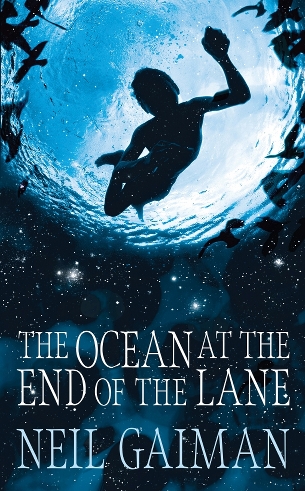Why you can trust GamesRadar+
The Ocean At The End Of The Lane book review .
Writing for children can be a very different thing to writing about children – and, despite what Martin Amis may think, they’re both incredibly difficult tasks to perform well. Neil Gaiman has shown on many occasions that he can write for children with the very best of them – he’s won the major children’s book awards on both sides of the Atlantic – but this, his latest book, is a novel For Adults. It just happens to be about a seven-year-old boy.
Where this links in with his children’s writing is in Gaiman’s ability to crouch down on the floor, level with a child, and engage with them on their own terms. There’s no talking down here, no false jollity or weirdly precocious, adult thoughts and words coming from a child’s mouth. Instead, The Ocean At The End Of The Lane is full of light touches that nudge at just the right points to spark a memory in the corner of your mind – ah yes, that is what it was like to be a child.
It helps that the story is about an adult remembering his childhood. Our unnamed narrator retreats from a funeral, driving first to the site of his boyhood home (now demolished), then visiting a local farm, where he once played with a young girl who insisted that the farm’s pool was actually an ocean. Sitting down at the poolside, he remembers the few days he spent with Lettie Hempstock – days that have been missing from his memories ever since. He remembers how together they released a monster into his world, his home, fought together to remove her, and, finally, battled to get rid of the monsters who followed her.
Unlike many of Gaiman’s previous works, this book doesn’t seem to draw specifically on one mythology – rather, there is a sense of otherworldliness that creeps up on the reader, until you accept "fleas" (ancient creatures from “the old country”), hunger birds ("cleaners" who remove the things that shouldn’t be in our world - violently), the protection given by a fairy ring, and an ocean that can be carried along in a bucket. And the Hempstock farm itself, with its three women – maiden, mother, crone – who seem older than the world. Only the otherworldly elements are given names – the narrator, his family and even the lodger whose suicide triggers events all remain unnamed. This all adds to the slightly dreamy feel of the tale, as well as easily allowing you to place yourself within the action.
Far more terrifying than the ideas of monsters and devourers let loose in a child’s world is the malicious adult – here a nanny, Ursula Monkton: a “flea” in disguise who escapes from her own realm via the narrator and takes up a place in his home. Gaiman captures the sheer powerlessness of childhood perfectly; the knowledge that if someone can punish you and you know your parents will always believe their version, not yours, then the world is a terrifying place to be. It’s a threat that’s set against other, much more idyllic versions of a cosy rural upbringing: climbing trees, running around fields, enjoying milk fresh from a cow and fresh porridge with honeycomb.
This isn’t a compelling or page-turning novel – rather, it’s a book to sink into, allowing yourself to be gradually pulled along by its currents, into a childhood that’s half remembered. It’s a short book, with events taking place over just a few days, and since the consequences of his actions are forgotten by the main character, it’s easy to believe that nothing of importance has really happened. But experiencing those few days, that snippet of a childhood and a quest for survival in a world that’s already terrifying for children, is a joy, an experience that will stay with you long after the final page is turned.
Rhian Drinkwater twitter.com/rhian82
The latest issue of SFX is guest edited by Neil Gaiman. Exciting!
Read more of our book reviews .
SFX Magazine is the world's number one sci-fi, fantasy, and horror magazine published by Future PLC. Established in 1995, SFX Magazine prides itself on writing for its fans, welcoming geeks, collectors, and aficionados into its readership for over 25 years. Covering films, TV shows, books, comics, games, merch, and more, SFX Magazine is published every month. If you love it, chances are we do too and you'll find it in SFX.



